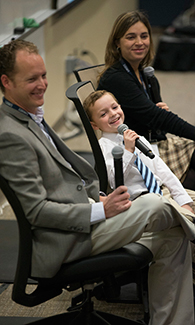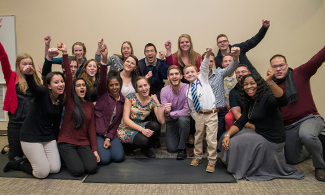Tuesday, January 26, 2016
Family shares Cystic Fibrosis story with student-doctors
Tue, 26 Jan 2016Shelley Andrews :: LUCOM Marketing and PR
Spend a few minutes around six-year-old Myles Gebhardt, and, odds are, he is just like most boys you know.
“He is a very active little boy. He loves soccer and baseball and basketball,” said father Rob Gebhardt.
“I love to play the drums,” Myles interrupted.
“Right, he loves to play the drums. He was eyeing up this set over here,” Rob replied, motioning to a drum set in the Liberty University College of Osteopathic Medicine (LUCOM) lecture hall that is used for weekly convocations.
Rob Gebhardt and Myles, along with wife and mother Stacy, carried on this lively and comical conversation in front of LUCOM student-doctors on Jan. 15.
 Their purpose was to help student-doctors understand what it’s like to live with Cystic Fibrosis, a genetic disorder that results in dysfunction in multiple body organs, including causing a buildup of thick, tenacious mucus in the lungs, pancreas and other organs.
Their purpose was to help student-doctors understand what it’s like to live with Cystic Fibrosis, a genetic disorder that results in dysfunction in multiple body organs, including causing a buildup of thick, tenacious mucus in the lungs, pancreas and other organs.
LUCOM associate professor of physiology Anthony Bauer, Ph.D., helped bring the Gebhardt family to the Center for Medical and Health Sciences for the second year in a row. One of his goals: to maintain the empathy that LUCOM students are noted for at admission, which can often be lost in the grueling first few years of medical school.
“At this point, these student-doctors are beginning their second semester, and many of them are wondering, ‘Why am I staying up every night until 1 or 2 in the morning studying and getting up and doing this day after day?’,” said Dr. Bauer. “You just can’t help but relate to this family, especially a little boy, and what they are going through.”
Rob Gebhardt started the family’s story from the beginning.
“When Myles was born, he received a heal stick and had a sample taken. It was to test for the CF [Cystic Fibrosis] mutation. We didn’t really pay much attention to it at the time. It was just a test they were doing in the hospital,” said Rob.
Three weeks later, the family received a postcard telling them that test came back positive for Cystic Fibrosis. Conforming blood and a sweat chloride test performed at their doctor’s office also came back positive for the genetic disorder that results in the disease.
At just three weeks old, Myles started taking enzymes with applesauce before every meal and snack.
“It helps his body break down foods and nutrients,” said Rob. “Right now, when you and I eat food, our body breaks it down, absorbs it and tells our body to absorb the nutrients including salt. Myles just sweats it all out.”
Myles’ diet is also a little different than most children. Myles eats more like an adult, consuming between 2,100 and 2,400 calories a day, including a lot of carbohydrates and sugar. That’s why you will find food items like chocolate milk and TastyKakes in his lunchbox.
“A lunch lady once made a comment to him, ‘That’s not a very healthy snack.’ But that actually is a very healthy snack for Myles. His body breaks down food in a different way,” said Rob.
Other differences at school include not being able to use the water fountain like the other kids, out of concern for exposure to the bacteria Pseudomonas, which can cause serious infections for Myles. He takes a water bottle to school and also makes frequent trips to the nurse’s office.
“No one in my class has CF. It’s only me. But the nurse knows I have to take all of the medicine,” said Myles.
When Myles was four, he started taking Kalydeco, a drug that targets the CF mutation he has. Since that time, his sweat tests have improved, his breathing is better and his weight has increased.
Despite the incredible improvements seen through treatment and careful control of Myles’ environment, the Gebhardt family will spend decades dealing with his Cystic Fibrosis, described as a very complicated disease by Dr. Bauer.
“CF affects multiple organs from the lungs to the gastrointestinal system. It is very important for the student-doctors to realize what they’re learning in the classroom really does have application and can make a difference in the lives of the very real people who will be their patients. They must acquire an appreciation of the need to push themselves to a high level of knowledge and confidence, because excellence makes a difference,” said Dr. Bauer.
 He also believes the Gebhardt’s story helps the student-doctors apply the core principles of osteopathic medicine: caring for a patient’s mind, body and spirit.
He also believes the Gebhardt’s story helps the student-doctors apply the core principles of osteopathic medicine: caring for a patient’s mind, body and spirit.
“It’s a good opportunity for the student-doctors to see how you need to holistically treat the family, as well as the disease. Mentally, emotionally and spiritually, the family and the patient must be prepared for this long duration illness,” said Dr. Bauer.
While the demands of daily medications, frequent doctors visits and other CF-related issues will continue for the rest of Myles’ life, Rob and Stacy have adjusted their life to meet those expectations and care for the son they love.
“Our routine in the morning might look overwhelming for some. But it’s what we know and what we accept. It’s our natural life,” said Rob.
They are also plan to continue being an outspoken family in advocacy for the Cystic Fibrosis Foundation.
“They just exude this positive attitude, and they have such an apparent strong faith as well. I think their actions and commitment show they are more than just being good parents. I think they have an extra burden on their hearts to also be advocates for the treatment and cure of the disease and to bringing others to understand the bigger picture,” said Dr. Bauer.